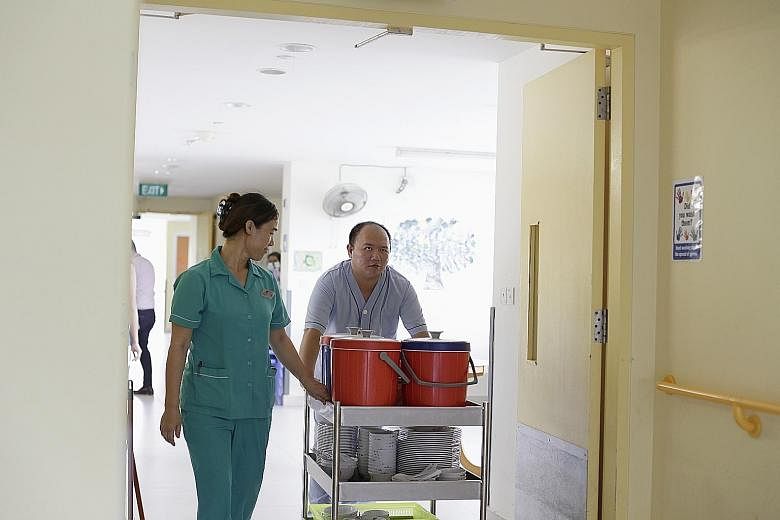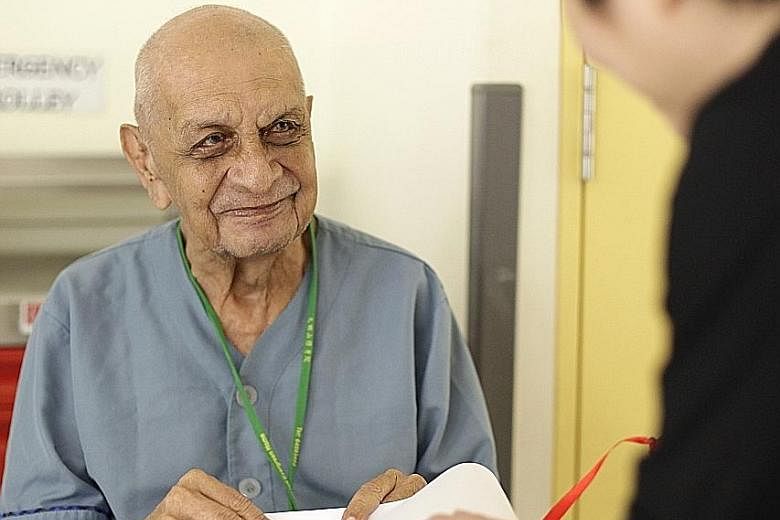Step out of the lift at the third floor of Bright Hill Evergreen Home and visitors will come face to face with a bright-eyed elderly man sitting upright in a chair, a lanyard card holder slung around his neck.
Mr Abraham Issacs, 88, wears the same blue uniform as the other nursing home residents, but a closer look at the card reveals that he is the "security officer" of the ward.
"I do my duties properly. I check the visitors, check their bags, check everything. I never give them a chance," he said with a serious nod.
Mr Issacs was given this "job" recently as part of a broad initiative by the 248-bed nursing home in Punggol to help residents live more purposefully.
The "dignity of care" project, as it is informally referred to, began in April last year and is being rolled out with the help of external consultants. It is part of an ongoing effort by Bright Hill to improve care.
Ms Cheng Siok Khoong, chief executive officer of Bright Hill, said that all its departments, from nursing to finance, kitchen and operations, are supporting this project.
For starters, staff are encouraged to interact with residents in a more personalised manner, and to think out of the box when customising care for residents who may be difficult, depressed or unresponsive.
Other changes include making the residents' routine more flexible. They now start their day progressively from 6am and can turn in anytime after around 7pm. Previously, the schedule was more structured.
The home also introduced a "choice menu" which takes into account the residents' preferences at selected meals.
They can pick a food item from an assortment of local favourites and drinks, including healthier options. Treats such as ice cream and juices are served occasionally.
Some residents are given "jobs" or certain responsibilities to fulfil.
Mr Issacs, for example, has moderate dementia, said Ms Cheng. The bachelor, who was admitted to the home in 2013 was a former security guard - and proud of it.
He was appointed the ward security officer, given a seat at the entrance of the ward and a cardiac table - the kind of movable table that slides up beside hospital beds - with a small stack of folders and papers for visitors to "sign in".
The IT department also made a staff card that said he was a guard of a made-up security firm.
This "job" has improved his mood and energy. Holding up the laminated staff card, Mr Issacs said: "This is very important. I put it under my pillow when I sleep, so nobody can take it."
Another resident, Mr Goh Tock Hong, was given the job of clearing the tables after meals. He helps load a trolley with dirty crockery and cutlery, which is taken to the kitchen, where others will do the washing.
"I'm doing this so I can grow stronger," said Mr Goh.
"Initially, my hands were a little tired, but now I do this three times a day," said the 43-year-old, who has dementia and was admitted in 2015.
This was a switch from his previous stance, where he did not want to do exercise or rehabilitation.
The "dignity of care" initiative was piloted at the dementia ward, which has about 50 residents. It is now being rolled out in phases to other wards. The process is estimated to take about two years to complete.
This is the first time Bright Hill has done such an extensive review.
All the departments had a part to play, said Ms Cheng.
While some costs were incurred, staff headcount has not increased.
"I wouldn't say that it is totally zero cost. But it is minimal, and it is to support or deliver the better efficiency. The returns are there for the long term," said Ms Cheng, who did not reveal the figures.
She added: "I was amazed at the transformation of some clients. The breakthroughs will also help to spur staff to come up with more ideas."
Poon Chian Hui



